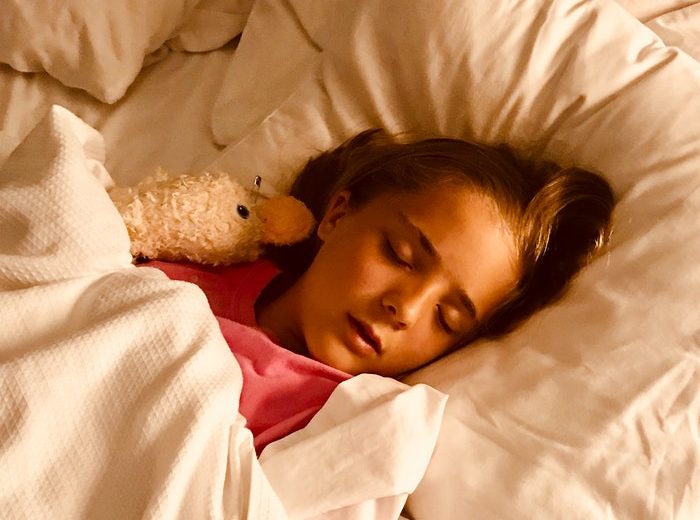Sleep, both during the day and the night, allows your child’s brain to process everything…

One of the biggest concerns parents face is whether or not their child is getting the right amount of sleep. From trying to get a baby down for a nap to determining when it's time for a preschooler to stop napping during the day, to what time is best for bedtime, we know how much of a parent's stress revolves around sleep. To help you make the best choices for your child as well as minimize some of your worry, our preschool in Raleigh is taking an in-depth look at sleep - why it's important, fostering good habits, and of course, how much sleep each age group needs.
Why Is Sleep Important for Children?
You've had days where your baby or toddler has been in a mood because they didn't sleep well or missed a nap. You've probably spent hours pacing the floors with a fussy infant because they're so overtired it's hard to get them to settle down. There's no question that babies and kids need sleep to restore their energy and be in a better mood when they're awake, so let's look a bit closer into why this is.
Our sleep-wake cycle is called a Circadian rhythm and it typical revolves around cycles of light and dark. In babies, the Circadian rhythm begins around six weeks of age, though they certainly aren't set in stone. In fact, it takes a few years for the rhythms to really set into place to allow for longer stretches of wake time and longer stretches of sleep. During this time, your child goes through two states:
- Rapid Eye Movement (REM) - The brain is more active during this time. Not only does dreaming take place, but this is when mental development and memory creation and retention occur.
- Non-Rapid Eye Movement (NREM) - This state is when the brain is at rest and the body focuses on repair and growth. Hormones are released that promote physical and mental growth and tissues repair themselves while energy is restored.
If your baby or young child misses out on this time, it can set back their development as well as leave them feeling cranky, tired, and fussy.
Creating Good Sleep Habits in Toddlers and Preschoolers
For toddlers and preschoolers, creating an environment that supports good sleep is just as important as it was when they were newborns. However, getting their very active minds and bodies ready for sleep can be challenging. Here are some tips to help you help your child get ready for a long night of good, restorative rest.
- Turn off screens - tablet, television, etc - at least an hour before bedtime, and focus on more quiet activities like blocks, coloring, and reading stories.
- Let them choose their pajamas, what books to read, or other aspects of the bedtime routine. These help them feel in control and are less likely to fight bedtime.
- Avoid any sugary drinks or snacks at least an hour before bed. Instead, if they're thirsty or hungry (and they haven't brushed their teeth yet) try milk or water and crackers with peanut butter.
- Rock with them (or snuggle, sing, etc) until they are drowsy, but put them to bed still awake.
- Keep the bedroom dark aside from a low nightlight and use blackout curtains if they fall asleep before it gets dark outside.
- If they get up in the middle of the night, take them back to their bed (after calming them if they had a nightmare or are upset) with minimal fuss.
How Much Sleep Does Your Child Need?
Before we delve into how many hours your child should sleep each night, it's important to know that these are averages and general recommendations. Some children stop napping at 12 months and do just fine, other children still need a nap after preschool, and how much sleep they need each night can vary. But here are some guidelines to give you an idea of when to set bedtimes and know what to expect:
- Newborns (birth to 3 months): 18 hours a day, between two and four hours at a time.
- Infants (4 to 12 months): 12 to 16 hours a day. While they may not sleep all at once, you may see a longer stretch at night for 7 hours, then a few naps during the day, and by the time they're near their first birthday, they may be sleeping 12 hour stretches and taking a short nap in the afternoon.
- Toddlers (12-36 months): 11-14 hours. Often, children this age will sleep 10-12 hours at night and still take a one to two hour nap in the afternoon.
- Preschool (3-5 years old): 10-13 hours and many children will have dropped the nap and will sleep through the night.
Again, every child is different, and these are guidelines from the American Academy of Sleep Medicine. If you have concerns about your child's sleep, it's important to speak with your pediatrician.
Schedule a Tour at Our Raleigh Preschool
If you’re interested in enrolling your child in a 5 star child care center in Raleigh, contact us today at our North Hills Drive location at 919-785-0303 or our Spring Forest location at 919-790-6888 or schedule a tour below!
